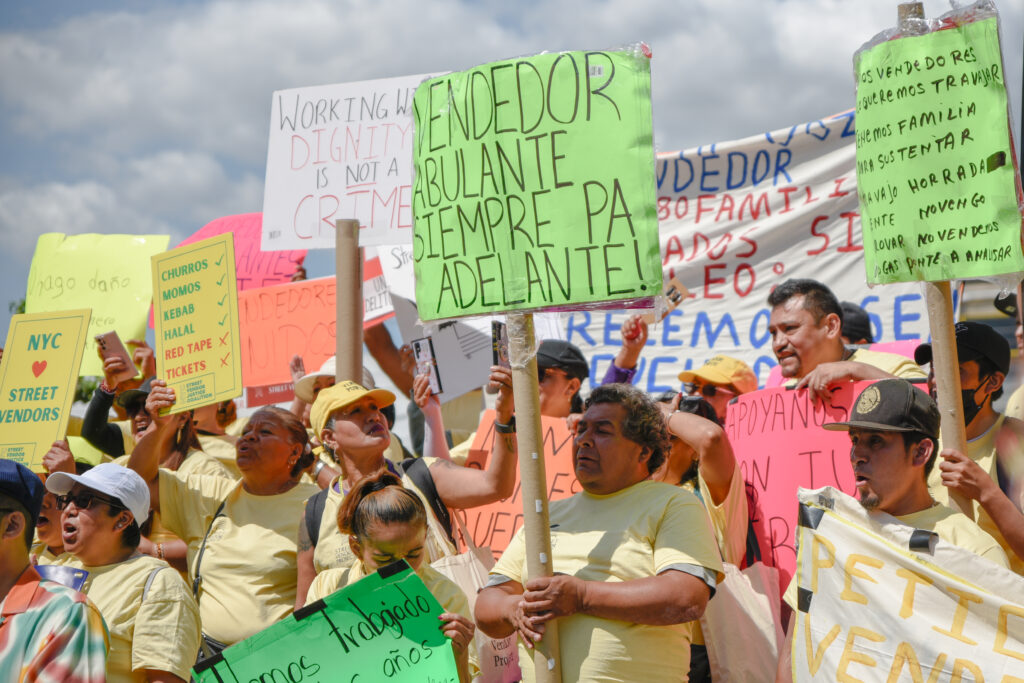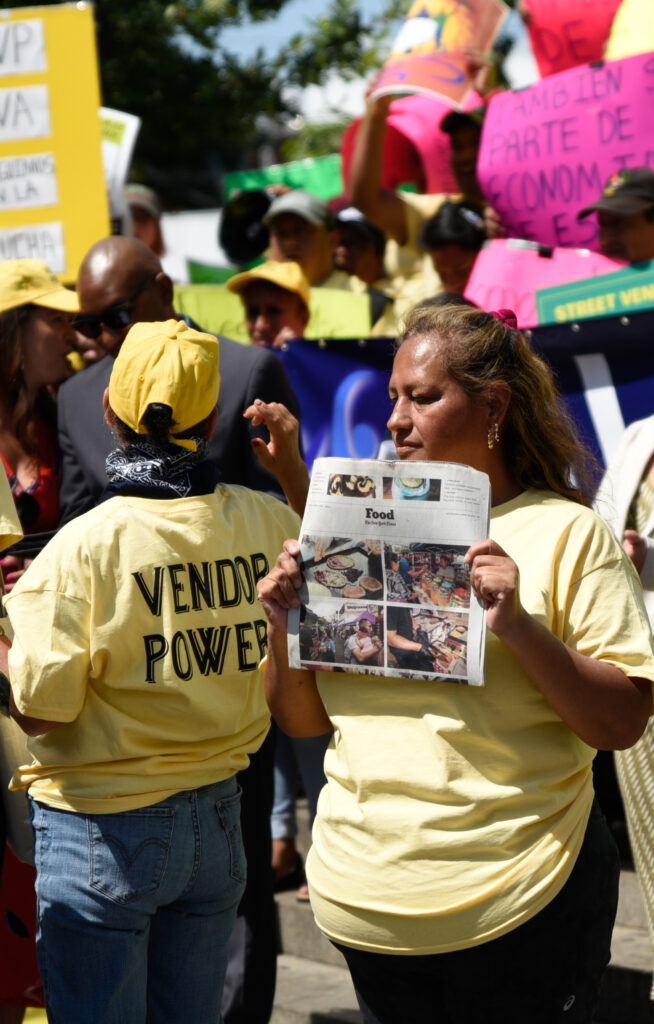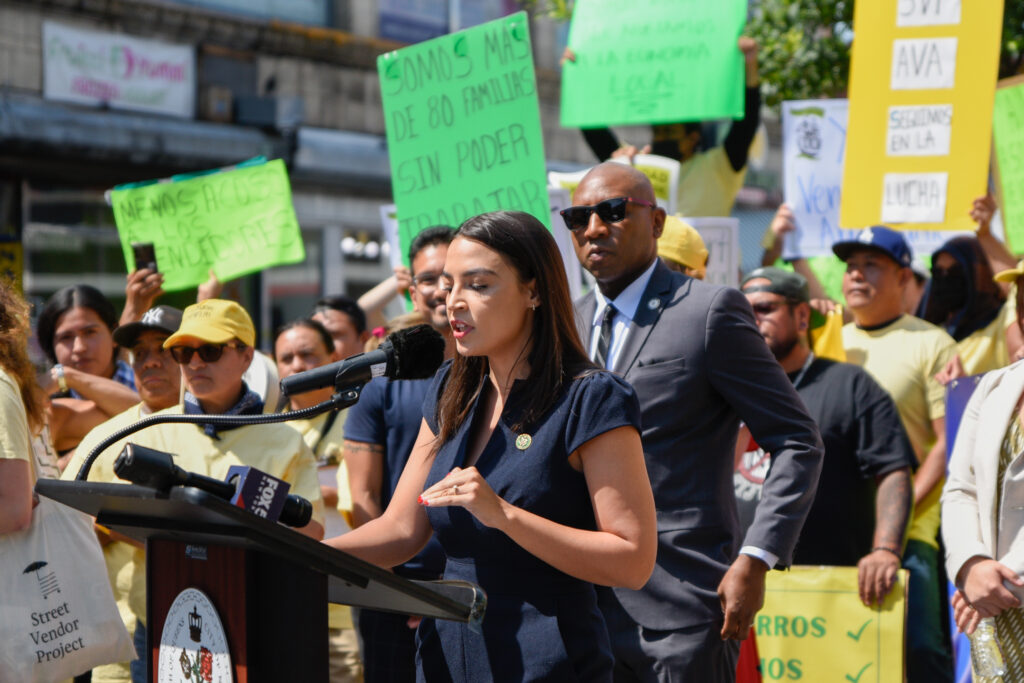
Close to a hundred street vendors rallied at Corona Plaza after a city raid put them out of work. Photo: Iryna Shkurhan
By Iryna Shkurhan | ishkurhan@queensledger.com
The vendors who normally fill up Corona Plaza by selling some of the city’s top ranked food were forced to trade their stands for slogans and signs after a raid left them out of work.
Two weeks ago, armed sanitation police arrived in the middle of the night and forced vendors operating without a permit to hand over their property and shut down. Days later, only a few vendors remained in the formerly bustling public plaza underneath the 7 train.
For these small business owners, there was no room to resist when the officers approached them. The fear of a fine starting at $1,000 hung over their head.
At a rally on August 2, elected officials joined the vendors and the local nonprofit groups advocating for a good faith solution. According to the Street Vendor Project, 84 vendors were affected by the crackdown and are now without income.
“The Plaza we’re standing in today is more than just a slab of concrete underneath a noisy subway line,” said Queens Borough President Donovan Richards. “It’s one of the 50 best places to eat in New York City according to the New York Times.”
The article calling the plaza “the closest thing New York has to a market square in a small Mexican town” in its annual top 100 in NYC list was referred to more than once by elected officials at the rally. One vendor proudly held out a print copy of the newspaper while standing near the podium.

Corona Plaza earned a spot on the New York Times 100 Best Restaurants in NYC list. Photo: Iryna Shkurhan
“The street vendors who work in this very place, embody all that we are as the world’s borough,” said Richards. “And it’s one of the reasons that we acknowledge those challenges that we had at this plaza.”
No one denied that the density of vendors kept growing following the pandemic leading observers and city officials to deem it unhygienic and unsafe. But many blame the city for failing to create a system that allows the vendors to operate safely with a fair chance at securing a license.
The Street Vendor Project at the Urban Justice Center has been running a campaign to lift the cap on street vendor licenses for over a decade. Currently there are only 853 merchandise vendor licenses in the city, what many say is an arbitrary number that hasn’t been updated since 1983. The backlogged waitlist list closed in 2016 after reaching capacity, restricting anyone else from a waiting spot.
“It is very easy to say follow the rules. But when the rules are built against you…If these folks could get a license, you don’t think they would choose to get a license,” said Assemblymember Catalina Cruz as she alternated between Spanish and English.
They argue that lifting the cap on permits and licenses would decriminalize the practice, increase space for vendors, bring more revenue to the city and make health and safety regulation more accessible. Some unlicensed vendors even resort to buying one on the black market for upwards of $20,000 when they initially cost $200, according to the project.

Congresswoman Alexandria-Ocasio Cortez criticized the city putting the vendors out of work. Photo: Iryna Shkurhan
“We have to increase the number of licenses for street vendors, rather than punish people who are just trying to provide for themselves and their family,” said Congresswoman Alexandria Ocasio-Cortez, a Corona resident, at the rally. “We have to support the way of life that people have made for themselves so that we do not increase the number of homelessness and the number of people out on the streets because the city has prevented their ability to support themselves. It makes no sense.”
The electeds and community leaders unanimously agreed that the inhumane nature of the raid was what brought them out that day. Especially given that the Corona Plaza Street Vendor Association, formed this past March, was in the process of talks with city agencies including the Department of Transportation, the Department of Sanitation and the Queens Economic Development Corporation. The association is made up of 81 members that represent 100 families.
“It’s important for me that I’m a street vendor. And the reason I choose to do this is because I can be the owner of my own small business alongside my daughter in my community,” said Rosario Trancoso, a member of the association. She says that the majority of her fellow members are also women from Latin America.
“We’re not saying that things weren’t getting a little bit tough out in the street. I think we all recognize that the economy had driven a lot of people to an informal street market,” Cruz pointed out. “What we’re saying is the way things were done in the middle of actual conversation with agencies, with state officials, with community members.”
“That’s what makes the city’s raid of Corona Plaza so disturbing, and infuriating,” added Richards.
“While one hand of the city is working together to work with vendors to come together to create an agreement with the department of transportation. The other hand of the city is cutting all of that community trust out,” said Carina Kaufman-Gutierrez, Deputy Director of the Street Vendor Project.
Organizers with the Vendor Project gained 3,398 petition signatures in support of street vendors returning to the plaza, 1,997 of which live in the zip code, according to Kaufman-Gutierrez.
The ones who were permitted to stay were forced to remove their canopies for shade, which the department of sanitation said were prohibited if bolted to the ground, according to reporting from Hellgate. Some switched to umbrellas to bear the heat lingering in the 90s that week.
The simultaneous migrant crisis in the city, in which the city has been struggling to provide basic resources for the 90,000 new arrivals since last spring, 50,000 of which remained in the city, was not lost on the speakers. They pointed out the hypocrisy of Mayor Adams asking the federal government to expedite work visas for migrants, while removing New Yorkers ability to make a living without any notice or backup plan.
“They are part of our community because they understand the ecosystem of how we as neighbors, whether you have a storefront, or whether you’re the smallest of small businesses with a vendor,” said Councilmember Julie Won. “They are the hallmark of our city.”
Seth Borenstein, Director of the Queens Economic Development Corporation, confirmed that the street vendors were working with the agency to come up with fair solutions.
“But one thing we know is there’s always going to be issues and problems. We solve them in a way by communication, not eradication,” said Borenstein. “And that’s what your city agency did last week.”



